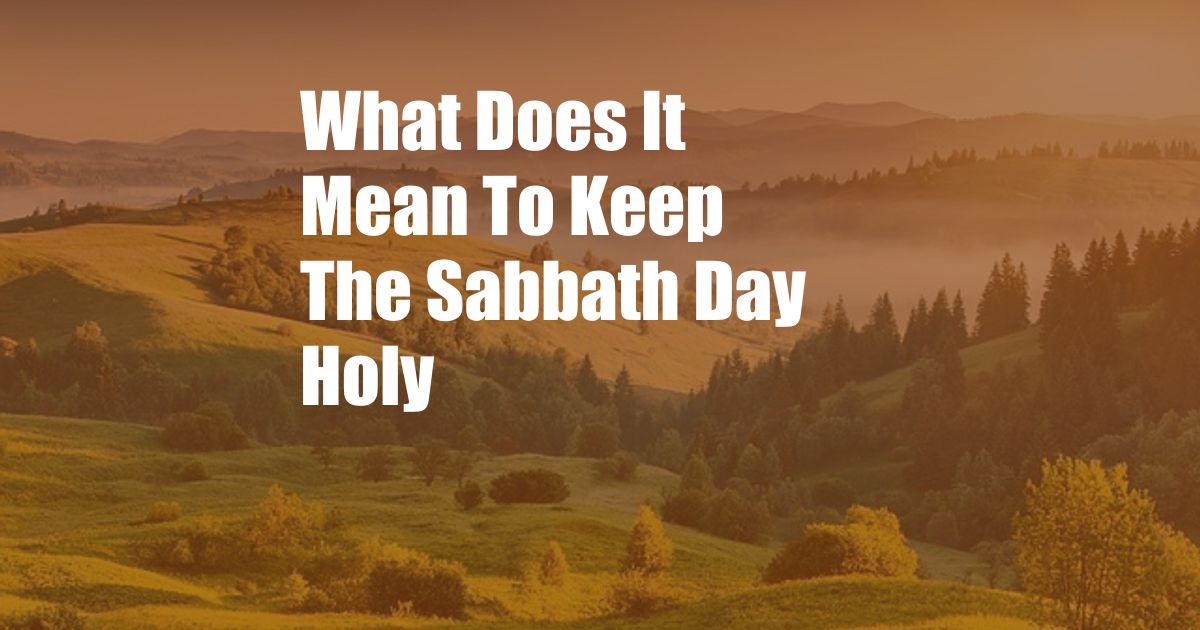
What it Means to Keep the Sabbath Day Holy
Sabbath, for those who practice it, is a day of rest and worship, a time set aside for both spiritual and physical renewal. For many Christians, the Sabbath falls on Sunday and is rooted in biblical teachings that date back to the Old Testament. The concept of keeping the Sabbath holy encompasses much more than simply refraining from work. It involves intentional engagement in activities that honor God and promote spiritual growth.
Observing the Sabbath has both a personal and communal aspect. It is a time for individuals to reflect on their relationship with God, engage in prayer, study scripture, and participate in corporate worship. On a communal level, the Sabbath provides an opportunity for believers to gather together, strengthen their bonds, and support one another in their spiritual journeys.
A Deeper Understanding of Sabbath Observance
The Sabbath holds profound significance in the biblical narrative. In the creation account, God himself rested on the seventh day after completing his work (Genesis 2:2-3). This act established the Sabbath as a pattern for humanity to follow. The fourth commandment of the Ten Commandments explicitly instructs the Israelites to keep the Sabbath holy (Exodus 20:8-11). The Sabbath was not merely a day of leisure but a sanctified time reserved for God and his worship.
Throughout the Old Testament, the Sabbath is repeatedly emphasized as a fundamental aspect of the covenant between God and his people. Breaking the Sabbath was considered a serious offense, as it violated the commandment and disrupted the relationship with God. Keeping the Sabbath holy enabled the Israelites to remember their deliverance from slavery in Egypt, reconnect with their creator, and experience his blessing.
The Sabbath in the New Testament
The New Testament affirms the importance of the Sabbath while expanding its meaning and application. Jesus himself attended synagogue on the Sabbath and participated in its observances (Luke 4:16). He also taught that the Sabbath was made for humanity and not the other way around (Mark 2:27-28). This emphasized the priority of human well-being over strict adherence to legalistic rules.
While the specific practices associated with Sabbath observance may vary among different Christian traditions, the principle of setting aside a portion of time for rest, worship, and spiritual growth remains central. It is a reminder of God’s sovereignty over time and his desire for his people to find sustenance and renewal in his presence.
Modern Perspectives on Sabbath Observance
In the modern era, Sabbath observance faces unique challenges and opportunities. The fast-paced and technologically interconnected world can make it difficult to disconnect from work and fully engage in Sabbath rest. However, the need for Sabbath has arguably become even more crucial amidst the constant stimulation and distraction that characterizes our digital age.
Many Christians are rediscovering the benefits of Sabbath observance, incorporating it into their lives in creative and flexible ways. Some choose to spend their Sabbaths in nature, connecting with God’s creation and experiencing his presence in the beauty of the outdoors. Others engage in activities such as reading, writing, or spending time with loved ones, fostering their spiritual and emotional well-being.
Tips and Expert Advice for Sabbath Observance
1. Plan Ahead: To make Sabbath observance successful, it is helpful to plan ahead. Choose activities that are both meaningful and restful, and schedule them into your week.
2. Set Boundaries: Establishing clear boundaries is essential to protect your Sabbath time. Politely decline invitations or commitments that conflict with your Sabbath plans.
3. Experiment and Adapt: Individual Sabbath practices may vary. Experiment with different activities and find what works best for you and your family.
4. Seek Support: Connect with other Christians who are committed to Sabbath observance. Sharing ideas, experiences, and encouragement can enhance your journey.
Expert Advice:
- “The Sabbath is not just a day off, but a day on with God.” – D.L. Moody
- “The Sabbath is a gift of God, a day to be enjoyed and honored.” – Billy Graham
- “Sabbath observance is a discipline that strengthens our relationship with God.” – John Piper
Frequently Asked Questions (FAQs)
Q: Is Sabbath observance required for Christians?
A: While the specific requirements may vary between different Christian denominations, the principle of setting aside a portion of time for rest, worship, and spiritual growth is generally recognized as being important.
Q: What are some practical ways to observe the Sabbath?
A: Engage in activities such as prayer, Bible study, worship, fellowship, rest, and recreation that promote spiritual growth and renewal.
Q: How can I make Sabbath observance a priority in my life?
A: Plan ahead, set boundaries, and seek support from others who value Sabbath observance.
Conclusion
Keeping the Sabbath day holy is not merely about following a rule or performing certain rituals. It is about entering into a deeper relationship with God, experiencing his rest and renewal, and celebrating the beauty of his creation. By intentionally setting aside time for Sabbath observance, we acknowledge our dependence on God, grow in our faith, and find balance and purpose in our lives.
As you embark on your personal journey of Sabbath observance, remember the words of Isaiah 58:13-14, which invites us to “call the Sabbath a delight.” May your Sabbaths be filled with joy, peace, and the fullness of God’s presence.